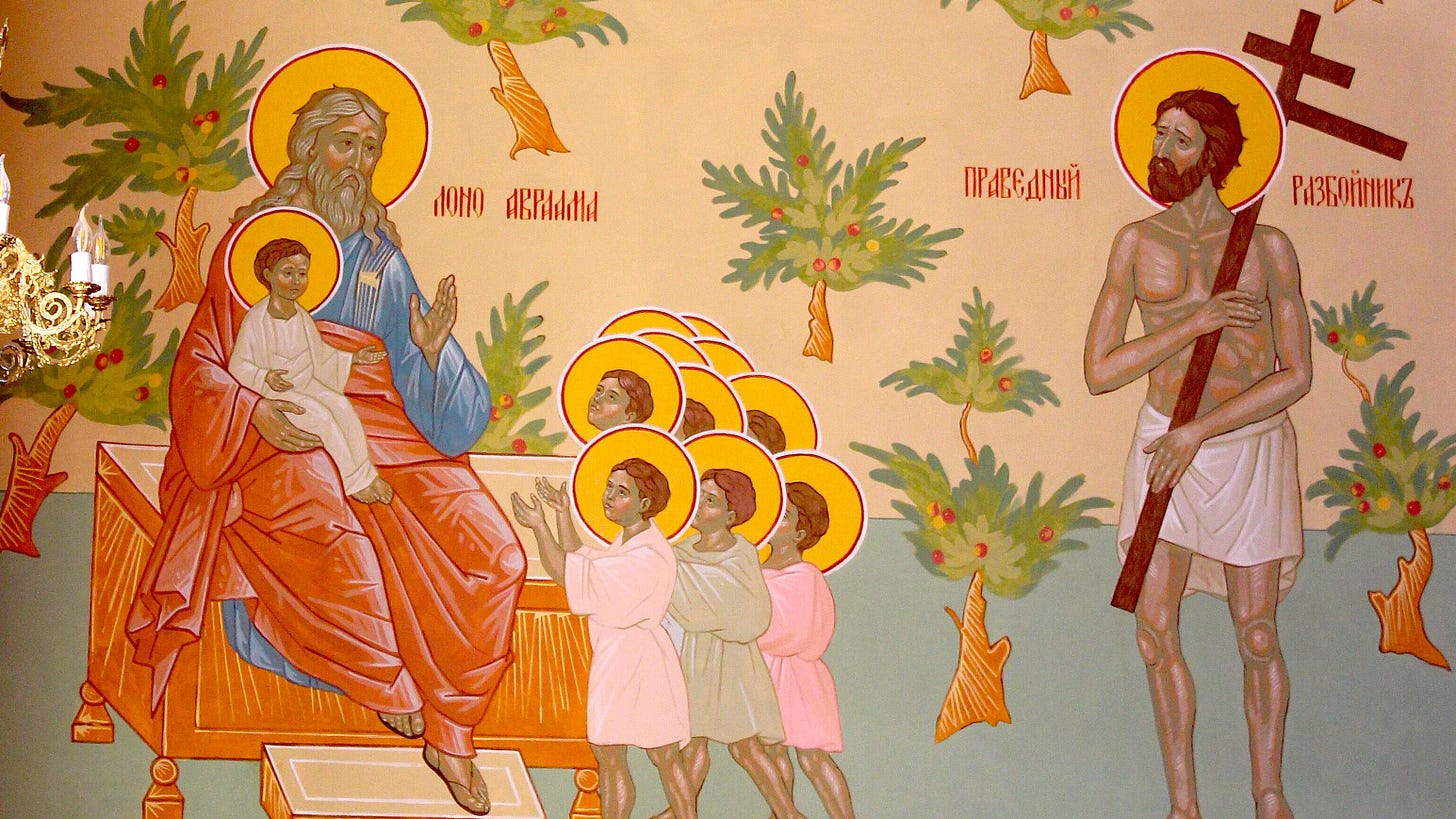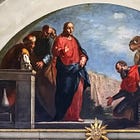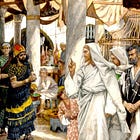Was the Roman Centurion a warning for 'Abraham's children'?
There's a serious lesson to be learnt here about faith and pride.

There's a serious lesson to be learnt here about faith and pride.
Editors’ Notes
In this part, Father Coleridge tells us…
How the prophet Isaias foretold the calling of the Gentiles to God’s Kingdom.
Why humility leads to God’s blessings, while pride causes people to lose them.
What the Centurion’s faith teaches us about trust in God and His power.
He shows us that the Centurion’s faith points to the Gentiles joining the Church, while the rejection of Christ by His own people shows how pride blocks God’s grace.
In the previous part, we compared Fr Coleridge’s explanation of the Gospels with the presentation in The Chosen series.
The Centurion whose servant is healed is a key character in the popular series The Chosen, and the story arc for ‘Gaius’ is crucial for driving the series forward.
But how accurately does it portray him? What does the series get right, and where might it have missed the mark?
See here for more:
This is an ongoing mini-series on Fr Coleridge’s presentation of this incident in the Gospels.
Hit SUBSCRIBE now, so as not to miss the next ones:
The Centurion’s Servant
From
The Training of the Apostles—Part II
Fr Henry James Coleridge SJ
1882, Ch. X
St. Matt. viii. 5–13; St. Luke vii. 1–10
Story of the Gospels, § 50
Third Sunday after Epiphany
From the previous part…
And then He added other words, very expressive indeed of the thoughts which must have been frequently in His Heart at this stage of His teaching, when He was beginning to turn away in disappointment and sorrow from those to whom He had been in the first instance sent, and who had received so many wonderful marks of His mercy and love.
This Centurion at His feet was not only a tacit rebuke to the duller faith of the chosen people, but he was a type and foretaste of the thousands and thousands who were to come to Him from among the Gentiles, and to receive the favours of the spiritual Kingdom from which the heirs of that Kingdom were to be excluded by their own fault.
Now for the first time did words significant of the rejection of the chosen people cross the lips of our Blessed Lord. The Apostles must have treasured them up with thoughtfulness and even anxiety, and, at the stage of their training at which they had now arrived, this new truth was all-important for them.
‘And I say unto you, that many shall come from the East and the West, and shall sit down with Abraham and Isaac and Jacob in the Kingdom of Heaven.’
Prophecy of Our Lord
It might have been thought that our Lord would stop here. The words which He had just uttered were a reference to a great passage in the prophet Isaias, in which the calling of the Gentiles to the privileges of the Kingdom of God was clearly foretold.
But in that passage, the prophet is commissioned to declare to the chosen nation the good purpose of God, in exalting it by the gathering in of other nations to the Kingdom, rather than its own future humiliation, the chastisement which its own incredulity would force Him to inflict, in its own temporary exclusion.
‘Fear not, for I am with thee, I will bring thy seed from the East and gather thee from the West. I will say to the North, give up, and to the South, keep not thou back; bring my sons from far, and my daughters from the ends of the earth.
‘And every one that calleth on My Name, I have created him for My glory, I have formed him and made him, bringing forth the people that are blind and have eyes, that are deaf and have ears. All the nations are assembled together, and the tribes are gathered.
‘Who among you can declare this and shall make us hear the former things?’ (Isaias xliii. 5-9.)
Even if this prophecy is to be applied, in the first instance, to the return of the Jews from their captivity, its language seems to have suggested the words of our Lord about the other quarters of the world.
But there is nothing in it concerning the rejection of the chosen nation. This was not in the first purpose, so to speak, of God, but it was the consequence of their own perversity.
The law of substitution
But now that our Lord was about to be Himself rejected by the nation on which His favours had been lavished so freely, the circumstance of the heathen Centurion at His feet was a picture to the Sacred Heart, not only of the admission of the Gentiles to the Gospel Kingdom, but of the working of that law of which we have so many instances in the history of God’s dealings with His creatures, the law of substitution of some in the place of others, who have forfeited their privileges.
This law has prevailed from the beginning, and it has not only been followed in the Providence of God, but it has also been continually dwelt upon by His chosen servants in their contemplation of those dealings. It was followed by the rejection of the rebel angels, and in the substitution of mankind in their place, and this is the subject on which our Blessed Lady seems to dwell devoutly in her Canticle the Magnificat.
‘He hath showed might in His arm, He hath scattered the proud in the conceit of their hearts; He hath put down the mighty from their seat, and hath exalted the humble; He hath filled the hungry with good things, and the rich He hath sent empty away.’
There is the same substitution of Jacob for Esau, as the heir of the promise, of David for Saul, as the King of the chosen people. And these substitutions involved immense issues, as by means of them the Jews came to their great place in the counsels of God, and our Lord, when incarnate, became the Son of David.
The New Testament is full of the substitution of the Gentiles for the Jews. Our Lord brings in this principle more than once into His great parables, the teaching of which is that those who are first called are in many respects heedless or unworthy, and that then the privileges which they forfeit are almost forced upon others in their stead.
St. John Baptist hit this weak point in his own people, when he warned them not to say that they had Abraham for their father, because God was able of the very stones to raise up children to Abraham.
‘Weeping and gnashing of teeth’
If we consider the various instances which the history of creatures presents to us of this forfeiture of high privileges, we find that the root of the evil is usually either pride, or one of the faults which issue from pride.
It was pride in the rebel angels that made them rebel.
It was the profane contempt of his privileges which made Esau sell his birthright, and this contempt came from pride.
Saul disobeyed, and his disobedience sprang from the same root.
On the other hand, the character of Jacob and of David is the character of humility, and we see in this Centurion, and in the other Gentile on whom our Lord showed special mercy, the Syrophœnician woman, who, as it were, wrung from Him the healing of her daughter, though, as He said, He was not sent but to the lost sheep of the house of Israel, by an unusual grace of faith founded on humility.
This then is the true secret for the right use and preservation of any external graces, or birth in the Catholic Church, of high vocation, or of any special favour, such as God bestows on those who live within the reach of great opportunities, or to whom His Providence addresses any particular calls to spiritual advancement.
It is humility that has the power to read and understand the advances which God makes to us in His particular dealings with our souls, it is humility that brings the unconscious and unwitting heretic or schismatic to the door of the Church, while men of learning, or ecclesiastical position, the leaders of parties or movements outside the Church, are wooed in vain by the same grace of conversion with which simpler souls close at once.
The history of these ‘children of the Kingdom,’ of whom our Lord more directly spoke on this occasion, is constantly repeated in the rejection of noble vocations, in the deaf ear which is turned by so many to the breathings of the Holy Ghost, inviting them to the practice of the Evangelical Counsels, in the men who can lead others to the perception of Catholic doctrines, and up to the very threshold of the Church, and yet themselves refuse to submit to the humiliation involved in submission to her rule.
They are, or they might be, the children of the Kingdom, but they are not humble, and so the grace passes away from them or passes them by. They are cast out into the exterior darkness. Outside the Church and the Kingdom of God there is eternal gloom, ignorance, delusion, sorrow, misery; within all is light and joy.
But it is not only gloom and darkness that are the lot of the rejected children—there is also ‘weeping and gnashing of teeth,’ both in the darkness outside the Church in this world, and much more in the darkness which will be the home of the enemies of God for all eternity. The remorse which they feel for the graces they have forfeited is one great source of their weeping, and beside the remorse of their own conscience, there is the pain justly inflicted in the decrees of God for so much unfaithfulness, and the countless sins into which that unfaithfulness has led them.
The Gentiles and the Kingdom
Thus for the first time almost did our Lord open to His hearers the future condemnation which was to fall on those who had inherited so many privileges and had not acted up to them.
His heart passed far beyond the immediate occasion of His words. It was no longer the faith that could draw from His mercy the most beautiful miracles, but the faith that was to be rewarded by the possession of the Eternal Kingdom of Heaven that His mind dwelt on.
It was no longer a single suppliant for a temporal grace who knelt before Him, for in him our Lord saw the multitudes of the Gentile Church taking possession of the inheritance which, in the first instance, had been promised to the children of Abraham, Isaac, and Jacob according to the flesh.
And with the picture of happy, simple credulity, as the world would deem it, there came also the other of captious resistance to grace in the heirs of the Kingdom.
The refusal to accept the boon promised them, on the terms on which alone it could be gained, and the terrible punishment of their pride and disbelief which was figured in the words about the exterior darkness, words which they themselves might have been inclined to use of the Gentile world outside themselves and the commonwealth of Israel, but which were to have their most sad fulfilment, both in this world and the next, in the miseries of their own rejection.
The two accounts of the incident
It has been said that St. Luke’s account of this incident in the preaching of our Lord is that of a person who has heard it from the Centurion or his friends, while the account of St. Matthew is that of one who was in our Lord’s company from the beginning.
This remark is sufficient to explain the different manner in which the story ended in the one case and in the other. St. Luke accompanies, as it were, the friends of the Centurion in their way back to the house from which they had been sent with the touching message of humility, ‘Lord, I am not worthy,’ and the rest.
On receiving that message, our Lord turned to the multitudes which were following Him, and made His remark about the great faith which had not been found even in Israel, the people which inherited all the promises and prophecies, as well as the privileges which had come down to them from their fathers—the possession of the true faith, the Law, the Temple, and its sacrifices, and the like.
These friends of the Centurion must have gone back to the house while he himself was making his way to our Lord, and if they did not meet him, the fact is easily to be accounted for by supposing the distance to have been very short, and the spot at which our Lord was to be readily reached by more than one path or street. When they returned to the house, St. Luke tells us, they found the servant whole who had been sick. The cure, therefore, had taken place while they were on their way.
St. Matthew, speaking of what passed between our Lord and the master of the servant, tells us that Jesus said to the Centurion, ‘Go, and as thou hast believed, so be it done unto thee.’ He could not grant the request in any more gracious way, or in any more tender words, than by making the Centurion’s own faith the measure, and as it were the cause, of the granting of the boon which he had asked, and then, at the moment when the words were spoken, the cure took place, ‘And the servant was healed at the same hour.’
To the nobleman our Lord had said, ‘Go thy way, thy son liveth,’ for the faith of that poor father had not yet risen to the required height. Faith came to him with our Lord’s injunction to depart. The faith of the Centurion had attained its full measure when he sent his message to our Lord, and so our Lord tells him it shall be ‘as thou hast believed.’
But what did the Centurion do after this? Does the tradition of the Church have anything to say?
And when we think of the Mass, have any man’s words been repeated more times, and in such a sacred setting, than the Centurion’s protestation of his unworthiness?
All this in the next part—and hit SUBSCRIBE now to make sure you don’t miss it.
From Fr Henry James Coleridge, The Training of the Apostles—Part II
In the next part, Father Coleridge will tell us…
What the tradition suggests happened to the Centurion after the miracle
How the Church daily repeats the Centurion’s words— “Lord, I am not worthy”—at the Holy Sacrifice of the Mass
What it means for them to appear at the very moment of the consummation of the Holy Sacrifice
Coleridge shows us how extraordinary it is that the words of this Roman Centurion are forever woven into the Church’s highest act of worship, enshrining his humility and faith as the enduring example for approaching the Holy Eucharist.
Here’s why you should subscribe to The Father Coleridge Reader and share with others:
Fr Coleridge provides solid explanations of the entirety of the Gospel
His work is full of doctrine and piety, and is highly credible
He gives a clear trajectory of the life of Christ, its drama and all its stages—increasing our appreciation and admiration for the God-Man.
If more Catholics knew about works like Coleridge’s, then other works based on sentimentality and dubious private revelations would be much less attractive.
But sourcing and curating the texts, cleaning up scans, and editing them for online reading is a labour of love, and takes a lot of time.
Will you lend us a hand and hit subscribe?
Read next:
Follow our projects on Twitter, YouTube and Telegram:







